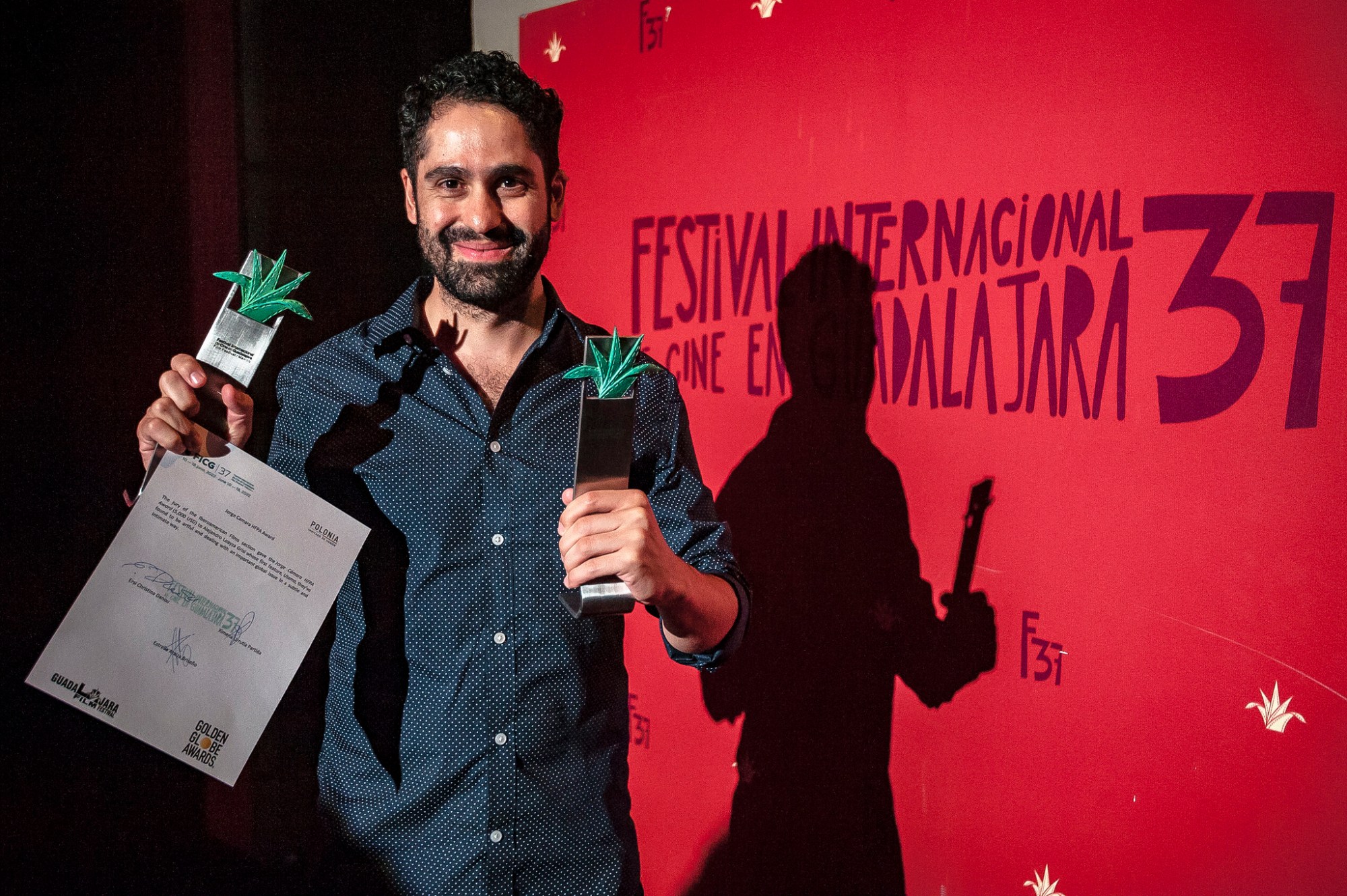
- Festivals
“Utama” Wins the Jorge Cámara Award at Guadalajara Film Festival
The Bolivian film Utama by director Alejandro Loayza Grisi won the award for Best First Work, Best Screenplay, and the Jorge Cámara Hollywood Foreign Press Association Award, which honors the late former president of the HFPA, at the 37th Guadalajara International Film Festival (GIFF), one of the most important festivals in Latin America.
Cámara, a three-time president of the HFPA, passionately collaborated with the film festival held annually in Mexico.
“I thank my team,” said Loayza Grisi during the awards ceremonies. “The cinema is a collaborative work. Without them, I would not have had the support to make my first film and it turned out well. I thank the entire team that gives their best.”
Utama offers a profound reflection on globalization and the consequences of the climate crisis on indigenous communities such as the Quechua in Bolivia.
“There is no camera in which so much desolation and openness get in the way of a cinematographic frame,” Loayza Grisi said in a conversation afterward. “We made decisions that led us to have the widest setting possible. The director of photography, the Uruguayan Bárbara Álvarez, is one of the best in Latin America and it was a luxury to have her. She understood the film that I wanted to tell. She understood the language that I wanted to use.
“We had the same feeling about the characters and their relationship with the landscape. The result is what we wanted and that is what is important.”
The GIFF awards added to the list of wins of the debut film by Loayza Grisi, son of fellow filmmaker Marcos Loayza. The drama has previously won honors at the Sundance (USA) and Malaga (Spain) festivals. The film’s commercial release is still pending.
In this year’s GIFF, most of the other prizes went to El reino de Dios (The Kingdom of God) by Claudia Sainte-Luce and Carajita (Little Girl) by Silvina Schnicer and Ulises Porras.
El reino de Dios tells the story of a boy’s struggle with his faith as he prepares for his first communion. The drama made its world premiere in the Generation Kplus section of the Berlin Film Festival.
Sainte-Luce, who accepted her prizes with words that recalled her time studying in Guadalajara, was moved by the love with which the festival received her film. El reino de Dios won the Mezcal Awards for Best Mexican Film, Best Director (Sainte-Luce), Best Actor (Diego Armando Lara Lagunas), Best Cinematography (Carlos Correa) and Youth Jury Best Film.
“Thank you very much,” Saint-Luce said. “I want to dedicate this award to my grandmother, who I just know planned everything and left three months ago. This award goes to her.”
Carajita, the other most awarded film of the night, received honors for Best Ibero-American Fiction Film, Best Director (Schnicer and Porras), Best Actress (Magnolia Núñez), and Best Cinematography (Ivan Gierasinchuk and Sergio Armstrong).
Porras thanked the GIFF for the accolades his film, made in the Dominican Republic, earned. “The country is producing a lot of auteur cinema now and you have to keep an eye on it for its quality,” he said.
Co-produced by Wooden Boat Productions (Dominican Republic) and Pucará Cine (Argentina), the drama revolves around the relationship between a girl and her nanny, beyond race and social class.
The closing ceremonies began with the GIFF Icon recognition to the group, Los Tigres del Norte, “for being worthy representatives of Mexican music.” The band leader, Jorge Hernández, expressed his gratitude and pointed out that it was an honor to be among filmmakers.
“It is a wonderful organization (the festival),” Hernández remarked. “Congratulations to all. Tonight, we are all winners in our hearts.”
A film’s future box office appeal is usually indicative with the coveted audience award. This year, the recipient of Pablo Orta’s Goya, which tells the story of two brothers who set out to save the dog that lives in their mysterious neighbor’s backyard.
Escocia no es un banco (Scotland is Not a Bank), directed by Carlos Matsuo and Cristian Franco from Guadalajara, was the winner in the Made in Jalisco section, which rewards the best of the Mexican state.
The Maguey Award for Best Performance went to the group of actors from the Icelandic film Beautiful Beings, directed by Guomundur Arnar Guðmundsson, while the Spanish production Mi vacío y yo (My Emptiness and Me) by Adrián Silvestre, won the Maguey Award for Best Film.
The Rigo Mora award, presented by Guillermo del Toro, was given to the short film Ice Merchants, by João Gonzalez, while the animated feature film Nayola by José Miguel Ribeiro won the “animation chucho,” as they call the award in this category.
There were special mention prizes for the short film Zoon and for Signe Baumane’s animated film My Love Affair With Marriage, which also received the same distinction at the Annecy International Animation Festival.
One of the highlights of the festival was the remote conversation between the director of the festival, Estrella Araiza, and Guadalajara native, director Guillermo del Toro. The director talked about the making of his stop-motion animation feature, Pinocchio. The film will premiere on Netflix in December. Del Toro revealed that Pinocchio “was shot with 20 animators on more than 60 sets in Canada and Guadalajara.”
Translated by Mario Amaya